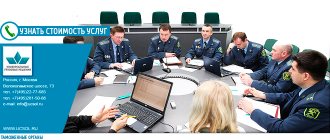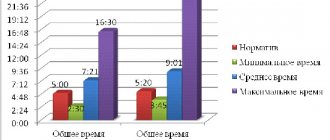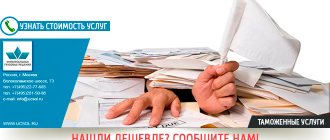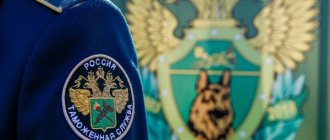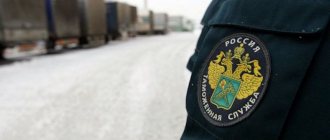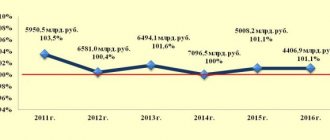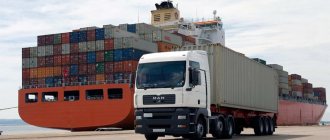Home Customs authorities
Customs authorities are executive authorities whose powers include the implementation of activities in the field of customs affairs in the territory under their jurisdiction. They are subordinate to the highest executive body, in our country it is the Government of the Russian Federation. Customs authorities take part in the development of state policy in the field of customs, rule-making and practical implementation and application of adopted regulations throughout the territory under their jurisdiction. Customs authorities carry out their activities guided by:
- The basic law is the Constitution;
- Customs Code;
- Other laws.
And also guided by:
- Decrees and orders of the head of state;
- Orders and resolutions of the government of the country;
- Regulatory legal acts of executive authorities;
- Regulatory acts of the Central Bank;
- Regulatory and legal acts of the governing bodies of the customs service;
- Ratified international treaties and agreements.
Functions, activities and tasks of customs authorities
In carrying out their activities, customs authorities are guided by the tasks and functions assigned to them.
Law enforcement - customs authorities are an executive authority and participate in the implementation of state customs policy, as well as the implementation of international treaties and agreements in the field of customs, ratified by the government of the country.
Legislative - customs authorities develop and initiate the adoption of legislative acts regulating customs business, or make changes to existing ones. They also have the right to issue their own regulations within their competence.
Customs clearance of goods and vehicles - customs authorities, being a government body, are vested with a monopoly right to carry out customs clearance of goods and vehicles moved across the customs border.
Fiscal - the duties of customs authorities include collecting customs duties, taxes, excise taxes and fees from participants in foreign trade activities within their competence.
Protection of intellectual property rights - customs authorities maintain their own Register of intellectual property objects and protect the legitimate interests of copyright holders.
The fight against smuggling - the fight against illicit trafficking in narcotic drugs, weapons, cultural property, radioactive substances, endangered animals and plants, intellectual property, the fight against international terrorism.
Currency control - the movement of large funds across the customs border must be carried out under the strict control of customs authorities with the filling out of a customs declaration.
Maintaining customs statistics - customs authorities are responsible for maintaining statistics on the volume of foreign trade, volumes of exports and imports of goods. These data are widely used, for example, in developing the state’s foreign economic strategy, adopting laws, new types of customs rates and duties.
Information - customs authorities are entrusted with the responsibility of informing and consulting the population on customs issues.
Scientific - customs authorities conduct or participate in scientific research work in the field of customs affairs.
Question 2. Principles of activity of customs authorities and their main functions.
Lecture 3. The system of customs authorities of the Russian Federation
Questions:
1. Concept and characteristics of the customs authorities of the Russian Federation.
2. Principles of activity of customs authorities and their main functions.
3. Financial activities of the customs authorities of the Russian Federation.
4. Law enforcement activities of the customs authorities of the Russian Federation.
5. Federal executive body authorized in the field of customs affairs.
6. Legal status of territorial customs authorities.
Question 1. Concept and characteristics of the customs authorities of the Russian Federation.
Customs authorities are federal executive authorities with special competence that carry out law enforcement and financial activities in the field of customs affairs
with the help of their inherent forms and methods of activity.
Customs authorities have distinctive features that allow them to be distinguished from other executive authorities:
1) they are directly subordinate to the Government of the Russian Federation , which, on the basis of Article 3 of the Law on Customs Regulation, exercises general management of customs affairs in the Russian Federation[1];
2) they belong to federal executive authorities . According to paragraph “g” of Art. 71 of the Constitution of the Russian Federation, customs matters fall under the exclusive jurisdiction of the Russian Federation. Therefore, all parts of the customs system are federal bodies, and are financed from the federal budget;
3) the activities of customs authorities are of an executive and administrative nature . Being directly subordinate to the Government of the Russian Federation, customs authorities act as the most important link in the system of state management of customs affairs.
Customs authorities carry out enforcement activities
which consists in the daily practical organization and implementation of customs affairs, in the implementation of the requirements of customs legislation. These bodies, using various forms and methods, exercise their functions and powers in the field of organizing the movement of goods and vehicles across the customs border, collecting customs duties, customs operations in relation to goods, customs control, etc.
Administrative activities
customs authorities forms a single whole with their executive activities and is expressed in the adoption, within their competence, of regulatory and other legal acts on customs affairs, valid throughout the territory under their jurisdiction and mandatory for execution by all lower customs authorities, legal entities, officials and citizens[2] .
4) customs authorities are bodies of special competence , i.e. they are vested with powers intended to be exercised exclusively in the area of movement of goods and vehicles across the customs border of the Customs Union. Carrying out customs activities is the main task that customs authorities perform on an ongoing and systematic basis;
5) they are given the status of law enforcement agencies . The content of law enforcement activities of customs authorities is disclosed in Art. 7 TK TS;
6) customs authorities have a flag and emblem
. Water vessels of customs authorities have a pennant. The emblem is placed on vehicles and aircraft of customs authorities. The description and drawings of the flag and emblem of customs authorities, as well as the pennant of their water vessels, are approved by the President of the Russian Federation[3] (Article 13 of the Law on Customs Regulation);
7) the special place occupied by customs authorities in the system of government bodies. Customs authorities, depending on the functions they perform, may have different statuses and be participants not only in customs, but also in other relations .
Thus, while carrying out customs business, these bodies are at the same time bodies of state customs control
, have the authority to exercise currency control.
According to Part 3 of Art. 22 of the Federal Law of December 10, 2003 No. 173-FZ “On Currency Regulation and Currency Control”, customs authorities act as agents of currency control
and have the appropriate powers in this area.
Customs authorities can be participants in civil law relations
, since they have the right to provide services for storing goods in temporary storage warehouses (TSW).
 the presence of a unified organizational structure characteristic of any customs authority. This structure includes the following elements: management, functional and sectoral divisions, as well as support staff.
the presence of a unified organizational structure characteristic of any customs authority. This structure includes the following elements: management, functional and sectoral divisions, as well as support staff.
Question 2. Principles of activity of customs authorities and their main functions.
The activities of customs authorities are based on certain principles , the list of which is enshrined in Art. 11 of the Law on Customs Regulation. This:
1) legality;
2) equality of persons before the law, respect and observance of their rights and freedoms;
3) unity of the system of customs authorities and centralized management;
4) professionalism and competence of customs officials;
5) clarity, predictability, publicity of the actions of customs officials, understandability of the requirements of customs authorities during customs control and customs operations, availability of information on the rules for carrying out foreign economic activity, the customs legislation of the Customs Union and the legislation of the Russian Federation on customs;
6) uniformity of law enforcement practice during customs control and customs operations;
7) preventing the imposition of excessive and unjustified costs on participants in foreign trade activities, persons engaged in activities in the field of customs affairs, carriers and other persons in the exercise of powers in the field of customs affairs;
 improvement of customs control, use of modern information technologies, introduction of progressive methods of customs administration.
improvement of customs control, use of modern information technologies, introduction of progressive methods of customs administration.
Let's take a closer look at some of the listed principles.
The unity of the system of customs authorities and centralized management is ensured by common goals and objectives, a single functional and organizational commonality of the parts of the system. Customs authorities are characterized by strict hierarchical subordination, strict subordination between the department's vertical links. At the same time, this principle combines unified centralized leadership with the initiative and responsibility of lower customs authorities for the performance of their functions in the territory under their jurisdiction.
Professionalism and competence of customs officials means the compliance of persons applying for the position of an employee or employee of a customs authority with the legally established requirements for the level and type of education, health status, professional experience, knowledge and skills. The conditions for entering the service of the customs authorities are defined in Art. 6 of the Federal Law of July 21, 1997 No. 114-FZ “On service in the customs authorities of the Russian Federation” (as amended on December 30, 2012)[4].
Clarity, predictability, and publicity of the actions of customs officials presupposes their action in accordance with the norms of customs legislation. Clarity of the requirements of customs authorities means the elimination of vague formulations when conducting customs control and performing customs operations. The requirements of customs officials must be predictable and based on the provisions of the Customs Code of the Customs Union and other international treaties and legislative acts. The Federal Customs Service of Russia informs and provides free consultations to participants in foreign trade activities on customs issues[5].
The functions of customs authorities are enshrined in Art. 12 of the Law on Customs Regulation. They inextricably combine rights and obligations, being, rather, the powers of the bodies in question. Depending on the areas of activity, the functions of customs authorities can be classified into several groups.
(1) Functions of customs authorities promoting international cooperation:
v assistance in the development of foreign trade of the Russian Federation, foreign economic relations of the constituent entities of the Russian Federation, acceleration of trade turnover;
v ensuring compliance with the prohibitions and restrictions established by international treaties of the CU member states in relation to goods imported into the Russian Federation and exported from the country;
v ensuring the fulfillment of the international obligations of the Russian Federation in terms of customs affairs, cooperation with customs and other competent authorities of foreign states, international organizations dealing with customs issues.
(2) Law enforcement functions
, according to which the customs authorities:
v identify, prevent, suppress crimes and administrative offenses referred by the legislation of the Russian Federation to the competence of customs authorities, carry out urgent investigative actions in criminal cases[6], carry out administrative proceedings in cases of violations of customs rules[7];
v provide assistance in the fight against corruption and international terrorism, combat the illicit trafficking of intellectual property, narcotic drugs, psychotropic substances, weapons and ammunition, cultural property and other items moved across the customs border of the Customs Union and the state border of the Russian Federation;
v provide measures to combat the legalization of proceeds from crime and the financing of terrorism when monitoring the movement of currency, securities, foreign currency valuables and traveler's checks across the customs border.
(3) Financial functions
, according to which the customs authorities:
v collect customs duties, taxes, anti-dumping, special and countervailing duties, customs duties, control the correctness of calculation and timely payment of these payments, take measures to enforce them;
v exercise, within their competence, control over currency transactions related to the movement of goods across the customs border, as well as the import (export) of goods, in accordance with international treaties and currency legislation.
(4) Information and advisory function
customs authorities includes:
v explaining to interested parties their rights and obligations in the field of customs legal relations, providing assistance, within the limits of their powers, to foreign trade participants in the exercise of their rights when carrying out customs operations in relation to goods and vehicles of international transport;
v informing and consulting government bodies, organizations and citizens on customs issues;
(5) To organizational functions
customs authorities include:
v carrying out customs control, improving methods for performing customs operations and carrying out customs control, creating conditions that facilitate the acceleration of trade turnover when importing goods into the Russian Federation and exporting goods from the Russian Federation;
v ensuring compliance with the procedure for the movement of goods and vehicles of international transport across the customs border of the Customs Union.
(6) Protectionist function
customs authorities includes:
v ensuring the protection of rights to intellectual property (within its competence)[8];
v assistance in the implementation of measures to protect state security, public order, morality of the population, human life and health, animals and plants, environmental protection, protection of the interests of consumers of goods imported into the Russian Federation;
v assistance in the development of the export and transit potential of the Russian Federation, optimization of the export structure, protection of the interests of domestic producers using customs regulation means.
(7) Scientific and statistical functions
customs authorities:
v maintaining customs statistics of foreign trade and special customs statistics;
v carrying out research and development in the field of customs.
Tasks and responsibilities of customs authorities:
- Carrying out customs clearance of goods and vehicles;
- Ensuring the correct calculation and timely payment of customs duties, duties and fees, compliance with prohibitions and restrictions;
- Ensuring compliance with customs legislation in the assigned territory;
- Fight against smuggling;
- Maintaining statistics of foreign trade operations;
- Currency control;
- Refund (offset) of overpaid and overcharged customs duties, balances of unspent advance payments, cash deposit;
- Registration of foreign trade participants;
- Registration of intellectual property objects;
- Informing and consulting interested parties on customs issues;
- Conducting examinations and research of declared goods and vehicles, documents for them, conducting forensic examinations;
- Proceedings in cases of administrative offenses and consideration of such cases, analysis of law enforcement and judicial practice, analysis of law enforcement activities;
- Operational search activities, inquiries and urgent investigative actions.
05/38/02 Customs Affairs (TZD)
Profile:
customs management
Full-time study:
duration of study: 5 years
Part-time study:
duration of study: 6 years
Graduate department:
"Socio-Economic Institute"
Documents regulating the educational process
Description of the educational program
Historically, customs became the first form of state regulation of foreign trade. Customs is an integral part of the economic and foreign trade policy of the state. The essence of customs affairs is manifested in customs tariff legislation, the organization of customs unions, the conclusion of customs conventions, the creation of free customs zones, etc.
The economic goals of customs are achieved by replenishing the state budget by collecting customs duties when moving goods and vehicles across the customs border of the Russian Federation.
The regulatory goals of customs affairs are achieved by establishing rates of export and import duties on goods transported across the customs border of the Russian Federation, as well as by establishing prohibitions and restrictions on the import and export of goods, licensing, issuing permits for the import and export of certain goods and a number of other measures.
Law enforcement goals of customs affairs are to protect the state security of the country, public order, life and health of people, morality, moral principles and cultural values of society; in the protection of animals, plants and the natural environment; in ensuring the interests of Russian consumers of imported goods; in the fight against illegal trafficking across the customs border of the Russian Federation of prohibited goods, weapons, objects of artistic, historical and archaeological property, etc.
Employees of customs offices and customs offices, declarants, customs inspectors, customs managers, foreign economic activity specialists, customs clearance specialists, customs brokers, customs carriers work in the field of customs affairs. People who have received specialized education can confidently apply for leadership positions in the field of customs
Disciplines studied:
- History of customs affairs and customs policy of Russia;
- Fundamentals of customs affairs;
- Pricing in the customs sector;
- Customs payments;
- Economic security;
- Economics of customs;
- Commodity research, expertise in customs affairs;
- Customs clearance of goods and vehicles;
- Customs regimes and special customs procedures;
- Declaration of goods and vehicles;
- Organization of customs control of goods and vehicles;
- Customs and tariff regulation of foreign trade activities;
- Institutes of administrative and customs law that regulate the activities of customs authorities;
- Identification and basis for the investigation of administrative offenses within the competence of customs authorities;
- Fundamentals of investigation of crimes within the competence of customs authorities;
- Basics of document flow in customs authorities;
- Personnel management in customs authorities;
- Management of customs authorities;
- Customs management
Acquired knowledge, skills and abilities
A specialist in the field of training “Customs Affairs” must solve the following professional tasks in accordance with the types of professional activity and training profile:
activities related to the performance of customs operations, the application of customs procedures, the collection of customs duties and the conduct of customs control and other types of state control:
- carrying out customs operations;
- application of customs procedures;
- carrying out customs control, including after the release of goods, and other types of state control;
- ensuring, within its competence, compliance with customs tariff regulation measures and prohibitions and restrictions in relation to goods transported across the customs border of the Customs Union;
- application of commodity nomenclature for foreign economic activity;
- determination and control of the customs value of goods;
- control of the correctness of calculation, completeness and timeliness of payment of customs duties, calculation and collection of penalties and interest;
- debt collection, refund of customs duties and other funds;
- ensuring, within its competence, the protection of intellectual property rights;
- implementation, within its competence, of currency control of operations related to the movement of goods across the customs border of the Customs Union;
organizational and managerial activities:
- management of the activities of customs (customs post) and their structural divisions;
- organizing the work of performers to carry out specific types of work and services;
- control of the activities of departments, groups of employees, employees and employees;
- formation of organizational and management structures of customs houses (customs posts);
- motivating and stimulating employees, employees and workers aimed at high-quality performance of their job duties;
- organizing the collection of information to select management decisions;
research activities:
- monitoring the results of the activities of customs authorities, conducting research and forecasting the achievement of goals and tasks of their activities;
- scientific substantiation of proposals for improving professional activities;
- development of methods and organization of experiments and tests, analysis of their results;
- development of proposals for the implementation of research results into the practical activities of customs authorities.
Sphere of professional implementation
A specialist in the field of training “Customs Affairs” prepares for the following types of professional activities:
- activities related to the performance of customs operations, the application of customs procedures, the collection of customs duties and the conduct of customs control and other types of state control;
- organizational and managerial activities;
- scientific research.
The specific types of professional activity for which the graduate is mainly prepared should determine the content of his educational program, developed by the higher education institution together with interested employers.
Specific types of professional activities for which a specialist is mainly prepared are determined by the higher education institution together with students, scientific and pedagogical workers of the higher education institution and employers' associations.
Demand in the labor market
Specialists who have received training in the field of “Customs Affairs” with a specialization in “Customs Management” are successfully employed at various enterprises in various fields of activity:
- Federal Customs Service;
- Government departments;
- Regional customs offices;
- Customs;
- Customs posts;
- International corporations;
- Logistics companies;
- Companies operating in international markets and/or working with foreign suppliers.
Contact Information
410028, Saratov, st. M. Gorkogo, 9 (corner of Michurina St.), Department of Commerce and Business Process Engineering, IRBiS SSTU named after Yu. A. Gagarin Telephone:
Full information about admission to SSTU in the section “Applicants”
Rights of customs authorities
According to Article 19 of the Federal Law of November 27, 2010 No. 311-FZ “On Customs Regulation in the Russian Federation,” customs authorities have the following rights:
- Take measures provided for by law;
- They require documents, information, the presentation of which is provided for by the provisions of customs legislation;
- Check the identity documents of citizens and officials participating in customs operations;
- They require individuals and legal entities to confirm their authority to perform certain actions or carry out certain activities in the field of customs affairs;
- Carry out operational search activities, investigative actions and inquiries;
- Carry out urgent investigative actions and inquiries within the limits of their competence;
- Bring persons to administrative responsibility in accordance with the law;
- Used in urgent cases, means of communication or vehicles belonging to organizations or public associations to prevent crimes, pursue and detain persons who have committed crimes or are suspected of committing them;
- Detain and deliver to the office premises of the customs authority persons suspected of committing crimes, who have committed or are committing crimes or administrative offenses in the field of customs affairs;
- They document, video and audio record, film and photograph facts and events related to the import and export of goods.
- Submit claims and applications to courts or arbitration courts: For the forced collection of customs duties, taxes, customs duties, interest and penalties;
- On foreclosure of goods for payment of customs duties, taxes, customs duties;
- On recognition of property as ownerless.
Customs gives criminal cases
Even conscientious participants in foreign trade activities who do not underestimate the real value of goods, do not hide cargo and provide reliable information can become the object of inspection by the customs authority. Despite the public declaration of the need to increase the rate of economic growth and the level of investment activity and industrial production, the protection of foreign economic activity market participants from unlawful interference by government bodies seems doubtful. Moreover, companies that do not import goods into Russia on their own and purchase goods on the country’s domestic market may also become objects of customs inspections, including in criminal proceedings.
Unnoticeable
There is a stereotype that customs authorities carry out only control and supervisory functions in the field of customs affairs. Indeed, the structure of customs is dominated by units whose activities are primarily aimed at performing these functions: customs posts, departments for control of customs value, customs procedures, customs control after the release of goods, etc. At the same time, many units are vested with a wide range of powers to carry out verification activities in relation to participants in foreign trade activities and other persons.
But it is necessary to take into account that such customs departments in their activities can identify not only offenses for which responsibility is established by the Customs Code of the EAEU and the Code of Administrative Offenses of the Russian Federation, but also acts classified as crimes by the Criminal Code of the Russian Federation. Criminal liability for evasion of customs duties levied on an organization is provided for in Art. 194 of the Criminal Code. The investigation of criminal cases is carried out by customs investigators (parts 1 and 2) and investigators of the Investigative Committee of the Russian Federation (parts 3 and 4 of Article 194 of the Criminal Code).
According to the Federal Customs Service of Russia, 359 criminal cases were opened on cases of evasion of customs duties in 2021 (excluding cases of the Investigative Committee), while the total amount of unpaid customs duties amounted to 4.3 billion rubles, in the first half of 2021 - 163 criminal cases . In addition, customs identifies and initiates criminal cases regarding various types of smuggling, non-return of funds from abroad, and some others.
Among the many functional units of the customs service, those whose immediate tasks are the identification and investigation of crimes remain invisible to many: those carrying out operational search activities and inquiries in criminal cases.
How do customs detect such crimes?
As mentioned above, signs of a crime in the customs sector (and not only) can be identified by customs control and supervisory units and the relevant materials can be sent to the investigation unit.
For example, based on the results of an inspection by the customs control department after the release of goods, non-payment or incomplete payment of customs duties may be established in an amount amounting to a large amount (over two million rubles according to the note to Article 194 of the Criminal Code), which may be a criminal offense. Now, if the person being inspected disagrees with the decisions of the customs, he will have to defend himself not only by challenging the results of the inspection and demands for payment of customs duties, but also through criminal procedural means, and the customs authority has more powers to further verify the activities of the organization during the investigation of the criminal case.
Also popular is the situation of identifying signs of a crime during an administrative investigation, during which non-payment of customs duties in the amount of over two million rubles is established, and the materials are sent to the customs investigation unit. It should be borne in mind that bringing a legal entity to administrative responsibility in the field of customs affairs does not prevent the investigator from conducting an inspection on the same fact in accordance with the criminal procedure legislation, initiating a criminal case and bringing individuals to criminal liability.
It is typical to identify signs of a crime during operational investigative activities. This area of work is not accessible to the eyes of participants in foreign trade activities due to its secretive nature. The persons being inspected may not know for a long time (or may not know at all) that operational investigative measures are being carried out against them. Only when carrying out public operational investigative activities can a foreign trade participant or other persons become aware of coming to the attention of the customs authority (calling for an interview, conducting a public examination, etc.), while the rights of the person being inspected are limited by the specifics of operational investigative activities (actual impossibility get acquainted with the reasons for holding events, the reasons for initiating the relevant business or material, etc.). It is also necessary to take into account the presence in the structure of the Federal Customs Service of its own operational and technical units.
If signs of a crime are identified, the results of operational-search activities can also be sent to the inquiry officer or investigator for making a decision in accordance with criminal procedure legislation.
Also, any request, including from an unscrupulous competitor, can be the basis for the customs “law enforcement unit” to conduct an inspection against a foreign trade participant. At the same time, the inspection and application of criminal procedural measures (requests for documentation, calls for questioning, etc.) can continue for a long time, which creates inconvenience and tension in the organization’s activities, and sometimes even negatively affects its business reputation (customs authorities often request documentation from counterparties, call their managers to give explanations, etc.).
All the variety of reasons for inspection in criminal procedure indicates the possibility of its initiation in relation to any participant in foreign economic activity and not only. Every organization involved in trade turnover can be subject to inspection, including those who purchase goods exclusively on the domestic market.
What are the grounds for starting a procedural review? In fact, any - every message can be perceived by the inquiry officer and investigator as containing information about evasion of customs duties. There are also no mandatory criteria for initiating a criminal case - the presence, for example, of an inspection report or a requirement to pay customs duties is not legally established. In practice, at this stage, as a rule, everything revolves around calculating the amount of unpaid customs duties, but there is no mandatory form of calculation for the investigator - this can be a specialist’s certificate, conclusion, demand, etc. The only basis for initiating a criminal case established by law is the presence of sufficient data indicating signs of a crime, which is often subjective.
How not to transfer interaction with customs into the criminal legal sphere?
I have listed only some aspects of the work of customs authorities in identifying crimes under Art. 194 of the Criminal Code. Unfortunately, in our country, the use of criminal legal instruments to eliminate competitors or for the selfish interest of unscrupulous law enforcement officers is not new. Such risks discourage entrepreneurs from participating in foreign economic activity and even domestic trade.
For those managers who plan or continue to conscientiously participate in foreign economic trade, let me give several recommendations:
1. Pay careful attention to the preparation of documents, declaration of goods, organization of their delivery, not forgetting that customs clearance is a rather complex procedure that requires the mandatory participation of specialists in customs affairs. Save customs declarations, shipping documents, correspondence with foreign and other counterparties, carriers and customs representatives (brokers). Monitor the accuracy of shipping and other documents provided directly to the customs authority, broker or counterparties.
2. Use the services of only verified and reputable customs representatives (brokers); do not agree to dubious schemes to reduce the burden of customs duties.
3. Do not respond to proposals about the presence of connections in the customs authorities and the possibility of solving problems that have arisen in a “non-procedural” way. Inspections can affect everyone, since they can be initiated by various numerous units (and often automatically through random sampling), and the FSB bodies and the FCS’s own security units are actively fighting corruption within customs. At the same time, due to the specifics of customs activities, the attention of the special services to it is much more intense than to most other bodies.
4. When carrying out any verification activities, even not yet related to criminal prosecution, involve the participation of specialists competent in various fields: customs affairs, proceedings in cases of administrative offenses and criminal procedure in order to predict risks and prevent the development of further adverse consequences.
5. Defend the interests of the organization from the moment of the first claims from the customs authorities (requests for documents, adjustment of customs value, change of the HS code, initiation of a case of an administrative offense, etc.) in order to clarify the grounds and suppress further development of the situation in the criminal procedure.
In conclusion, I would like to note that even when initiating a criminal case, conscientious entrepreneurs should not despair, since evidence in cases of this category is an extremely scrupulous and complex process, involving a large volume of investigative actions and analysis of specific customs documentation. A consistent and vigorous defense often convinces law enforcement that there is no basis for criminal prosecution.
Customs system
The system of customs authorities of the Russian Federation is subordinate to the Government of the Russian Federation and the Ministry of Finance of the Russian Federation.
Structure of Russian customs authorities:
- The Federal Customs Service of the Russian Federation (FCS of Russia) is a federal executive body authorized in the field of customs affairs;
- Regional customs departments (RTU) are a territorial executive body that is part of the unified federal centralized system of customs authorities of the Russian Federation. RTUs are responsible for the implementation of customs affairs within a certain territory. They are directly subordinate to the Federal Customs Service of Russia. Today in the Russian Federation there are 8 RTUs (according to the number of Federal Districts of the Russian Federation): Far Eastern Customs Administration;
- Volga Customs Administration;
- North-West Customs Administration;
- North Caucasus Customs Administration;
- Siberian Customs Administration;
- Ural Customs Administration;
- Central Customs Administration;
- Southern Customs Department.
Organization of general and direct management of customs affairs in the Russian Federation
General management of customs affairs in the Russian Federation is carried out by the Government of the Russian Federation. The direct implementation of tasks in the field of customs affairs is ensured by the federal executive body authorized in the field of customs affairs.
2. The federal executive body authorized in the field of customs affairs, in accordance with the customs legislation of the Customs Union and (or) the legislation of the Russian Federation, carries out the functions of developing state policy and normative legal regulation in the field of customs affairs, ensures uniform application by all customs authorities in the territory Russian Federation customs legislation of the Customs Union and legislation of the Russian Federation on customs affairs.
3. The federal executive body authorized in the field of finance, in accordance with the legislation of the Russian Federation, carries out the functions of developing state policy and legal regulation in the field of customs payments and determining the customs value of goods.
The direct management of customs affairs in the Russian Federation is carried out by the Federal Customs Service of the Russian Federation as a state committee of the Russian Federation (hereinafter referred to as the Federal Customs Service). The Federal Customs Service exercises its powers directly and through subordinate customs authorities of the Russian Federation (hereinafter referred to as customs authorities)
In accordance with the Constitution of the Russian Federation, the general management of customs affairs is carried out by
Government of the Russian Federation. Direct management is carried out by the State Customs Committee of Russia,
being the central body of the federal executive power.
To implement the entire complex of customs measures (collection of customs duties
payments, customs clearance, customs control, etc.) special
Customs.
Customs authorities are law enforcement (Article 8 of the Labor Code) and paramilitary
authorities (decree of the President of the Russian Federation “On classifying customs authorities as state
paramilitary organizations"). Customs authorities form a single system,
which includes:
— State Customs Committee of Russia;
— regional customs departments;
— customs;
— customs posts.
As of March 1, 1995, the system of customs authorities of the Russian
The Federation, along with the State Customs Committee, includes 15 regional customs departments (12 territorial
and 3 specialized), 144 customs (67 border and 77 internal), 503
customs posts (192 border, 299 internal and 12 excise). For the last
years, the number of customs officers has increased significantly. If in 1991
Only 7 thousand people worked in the customs authorities, but now there is an army of customs officers
increased to 53 thousand.
Customs authorities interact with other government bodies,
enterprises, institutions, organizations and citizens. In some cases, legislation
allows the implementation of certain actions falling within the competence of customs authorities
bodies, other government bodies, enterprises and organizations. At
In this case, customs authorities have the right to control such activities (for example,
activities of the owner of a private temporary storage warehouse, customs carrier
etc.).
State bodies and their officials are obliged to provide assistance
customs authorities of the Russian Federation in solving the tasks assigned to them.
Currently, customs authorities ensure the implementation of 20 main
functions fixed in the Labor Code (Article 10). Among them:
— participation in the development and implementation of customs policy, as well as participation
in the development and implementation of economic policy measures regarding goods,
transported across the Russian border;
— protection of economic interests and provision within its competence
economic security, which is the economic basis of sovereignty
Russian Federation;
— assistance in the implementation of measures to protect state security,
public order, morality of the population, human life and health,
protection of animals and plants, protection of the natural environment, protection of interests
Russian consumers of imported goods;
— application of means of customs regulation of trade and economic
relationships; collection of customs duties, taxes and other customs payments;
ensuring permitting procedures for the movement of goods and vehicles
across the Russian customs border;
— implementation and improvement of customs control and customs
registration, as well as creating conditions conducive to accelerating trade turnover;
— implementation of currency control within its competence;
— fight against smuggling, violations of customs rules and tax laws,
relating to goods transported across the Russian customs border;
suppression of illicit trafficking in narcotic drugs, weapons, artistic objects,
historical and archaeological heritage of the peoples of Russia and foreign countries,
objects of intellectual property, endangered species of animals and plants;
assistance in the fight against international terrorism;
— fulfillment of the international obligations of the Russian Federation in terms of
relating to customs affairs; participation in the development of international treaties,
affecting customs affairs; cooperation with customs
and other competent authorities of foreign states, international organizations,
dealing with customs issues;
— other functions provided for by law.
They are not included in the customs system, but are subordinate to the State Customs Committee:
— customs laboratories that are created by the State Customs Committee to conduct examinations
and research of goods for customs purposes;
— scientific research institutions and educational institutions of professional
and additional education (for example, Customs Academy);
— computer centers, printing, construction and operational
and other enterprises and organizations whose activities contribute to the solution
tasks of customs authorities.
The latter include numerous customs warehouses and temporary warehouses.
storage facilities established by customs authorities. On March 1, 1995 they were opened
1021 temporary storage warehouses and 406 customs warehouses.
Property of customs authorities, as well as the above-mentioned organizations and
institutions subordinate to the State Customs Committee is federal state property.
Let's take a closer look at the individual bodies included in the customs system.
RF
The role of customs authorities in protecting the economic interests of the country
Having the Word of the Law in their arsenal, the customs authorities of the Russian Federation perform an important mission - they stand to protect the economic security of our country. Like a reliable cordon built at the customs border, customs authorities protect citizens of the country from counterfeit and sometimes even dangerous products circulating on the world market. They stand as a reliable barrier to the penetration of drugs, weapons, and explosives into our country. They contribute to the establishment of a favorable business climate in our country and protect our producers from unfair competition from foreign partners. They help to establish sustainable economic ties between Russia and other countries of the world.
